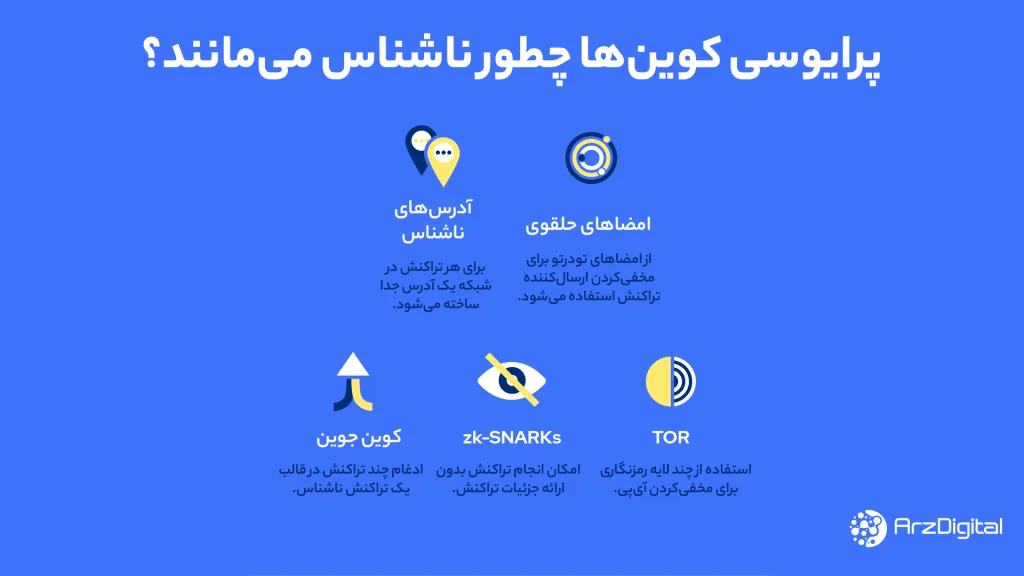A common misconception is that digital currencies are anonymous and untraceable! But maintaining privacy and anonymity of transactions only for a specific type of digital currency called Privacy Coin Or privacy-oriented digital currencies are justified.
In fact, only with a PriusiCoin or so Privacy oriented digital currency You can make transactions completely anonymously; Something that is not possible in Bitcoin and many other digital currencies. In this article we will learn that What is PriosyCoin?, What features does it have? And what a pain!
What is PriosyCoin?
Privacy Coin that to Digital currencies privacy or Pursuing escape are also famous Tokens and KevinThere are those who Blockchain They are for privacy and Anonymity of transactions And their records are designed. Among the most famous currencies of this category are: Monero (XMR), ZEC and Dash (DASH) pointed out
Privacy-oriented or “trackless” digital currencies with Encryption techniques Ability to view Transaction history and List of addresses have destroyed Of course, it is necessary to mention that the privacy features of these currencies can be different. In some cryptocurrencies such as Monero, transactions are hidden by default, but in others such as Horizon (ZEN) Individuals can choose for themselves whether to have a hidden transaction or not.
Read more: What is Blockchain?
History of Priusy Coins
As we said, according to many, Bitcoin is a privacy coin, if this belief is wrong. Monero was the world’s first private coin which was created in 2014 as a fork of Bytecoin and relying on secret transactions. In Monroe, an innovation called Ring Signature was used, which made the amount of transactions unclear.

Two years later and in 2016, ZCash using technology zk-SNARK It opened a new chapter in volatile currencies. ZCash technology required very high processing power, and this led to the creation of other private coins such as Verge, NavCoin and PIVX, each of which focused on a specific area.
Why is privacy and anonymity important in digital currencies?
No one can enter the bank with your national code or mobile number and empty all your accounts! On the other hand, banks know everything about you and this can be to your detriment; This is why privacy is so important in the cryptocurrency world.
- First of all, if a scammer knows how much digital currency you have, he can make you a target in his mind!
- Second, the banks where you have an account already know how much money you have and how much money you spend!
Digital currencies were created with the aim of creating financial independence and not depending on centralized institutions such as banks. Plus they help you transact and interact financially using accounts that are your aliases. So don’t forget that privacy and anonymity is one of the most important things in the world of digital currencies.
Understanding the performance of Priosy Coins
It can be said that a PryosiCoin functions similarly to physical cash, but in a completely digital ecosystem and space. When you withdraw cash from an ATM, the bank keeps a record of your transaction and account balance, but has no way of knowing what you do with the money after the transaction unless you return the money to the ATM.
Of course, it is much more difficult to maintain privacy in the digital space where user information is published in the cloud. Most cryptocurrency exchanges that support Priusycoins require users to verify their identity when registering and creating an account. However, due to the inherent characteristics of untraceable digital wallets or cryptocurrencies, it is difficult to track or disclose information about subsequent user transactions even on these exchanges.
However, keep in mind that although cryptocurrencies are more resistant to tracking than other cryptocurrencies, nothing is completely anonymous. Therefore, professional trackers with advanced tracking capabilities can even track the movement of Prius coins.
Interference between transparency and privacy in digital currency technology
The transparent nature of a public blockchain allows users to independently verify all activity that occurs on the network and ensure that the system is working as it should. When Bitcoin was launched as the first blockchain, this transparency was considered a very important and vital feature for the survival of the decentralized technology.
However, the fact that transactions in a transparent blockchain are not completely private has implications for user privacy. In fact, blockchain networks hide people’s identities, such as their names, but keep their addresses completely transparent. For example, if Bob sends Alice a bitcoin, he now knows Alice’s public bitcoin address and can now see all of Alice’s transactions or her total bitcoin amount every time she uses that address. to recognize

This tension between privacy and transparency has always been an inherent feature of public blockchains like Bitcoin. In the years following Bitcoin’s inception, it was a common misconception that Bitcoin transactions were private and completely anonymous, as creating a Bitcoin address did not require the disclosure of personal information or the identity of users; But with the above example, we realized that the identity of people is not so untraceable.
False anonymity in blockchains like Bitcoin
For example, in 2013, the FBI shut down a well-known dark web marketplace called Silk Road. As the details of this case became clear, it became clear that the FBI actually traced the flow of Bitcoin payments to an address associated with the owner of Silk Road, who was eventually identified as Ross Ulbricht.
Features of Pryosi Coins
- Privacy protection: One of the main features of Priosy Coins or persistent currencies is the focus on the privacy issue, and each of these types of currencies act in a special way to protect the privacy of users.
- Inventory hidden: In most non-trackable currencies, the account balance of users is not visible. For example, in Bitcoin, you can see how many Bitcoins there are in each address.
- transparency: One of the features of Priusi Coins is transparency while hiding! Maybe these two concepts are in conflict with each other, but blockchain has been able to bring these two things closer to each other.
- Use of special techniques: Ring signatures, secret addresses, untraceable transactions and coin mixing are among the techniques used by different coin privies to prevent the disclosure of user data.

Advantages and disadvantages of volatile currencies
In the table below, you can read the advantages and disadvantages of Pryosi coins.
| Disadvantages | benefits |
|---|---|
| High fees in non-tracking networks. | Hide the identity of users who have interacted with the accounts. |
| Prohibition in many exchanges and prominent countries. | Creating financial security for large organizations. |
| Use in organized crime, money laundering and terrorist financing. | Different layers for privacy. |
| Creating financial independence in countries that have laws against financial freedom. | |
| Users are no longer able to view inventory. |
What are the uses of Pryosi coins?
- Prius coins are not just for criminals. Although some people use digital currencies such as Monero, Dash, and ZCash for money laundering, transferring money from crimes, and the like, the uses of these digital currencies are not limited to these things.
- Reducing the control of a central institution One of the main uses of digital currencies is privacy or traceability. For example, if you live in North Korea and China, having a private coin is considered a great advantage, because it will practically cut off the hands of a monitoring organization such as the intelligence agencies of these countries from your assets.
- Protection of sensitive information Like the balance of the blockchain account, another use is privacy coins. You can protect yourself from fraud and criminals by using these digital currencies.
The difference between Bitcoin and common currencies with Pryosicoin
Contrary to popular belief, transactions in Bitcoin, Ethereum, and many other digital currencies are not anonymous. Although we do not need to provide personal information to conduct transactions in Bitcoin, the blockchain and the Bitcoin network are completely transparent, and a transaction or a specific address can be tracked from origin to destination.
It is also easy to see the balance of a bitcoin or ethereum address, and accordingly, if the transaction goes through a centralized system (such as an exchange) and the system has people’s personal information, it is possible to find out how much bitcoin a person has and What addresses did he transact with?
So at best we can say that Bitcoin is “semi-anonymous”. Achieving an acceptable level of anonymity in this network is a bit complicated and it can be said that complete anonymity is impossible. Using Bitcoin Explorer websites like Blockchair.com, you can track a Bitcoin address and all related transactions.
How do Priuscoins remain untraceable?
Prius coins employ advanced privacy protection mechanisms that distinguish them from conventional digital currencies. How do privacy coins guarantee the anonymity of users or make their transactions untraceable? Here we will learn about 5 important techniques of untraceable digital currencies.
Secret addresses
Stealth addresses use a combination of the user’s public and private keys to provide unique identifiers for each transaction. By using secret addresses in every transaction, Priusycoins generate a new one-time address every time you receive digital currency so that your identity remains hidden.
Secret addresses act like a proxy address on the blockchain, keeping your public address private. Proxy addresses in the blockchain act like third-party addresses and make the actual sender and recipient of a transaction remain unknown. Proxy addresses are used to protect privacy and allow users to interact with the blockchain without revealing their real address.
Ring signatures and Ring CT
A ring signature is a type of digital signature that allows a user to complete a transaction by joining a group (ring) and creating a signature, without knowing which group member did it. . Each member of the ring has his own keys, and signing a transaction does not require coordination with other members.
These signatures ensure the anonymity of users in transactions, as it is as if a group has done the transaction and it is not possible to identify which member of the group signed it. There is generally no way to know who in the group executed the final transaction. RingCT is an updated version of the ring signature in which not only the privacy of the sender but also the privacy of the receiver is preserved in transactions.
Mixed or mixer protocols like CoinJoin
Mixing protocols, such as CoinJoin, have been developed for networks such as Bitcoin and Dash to hide the owner, source, and destination of digital currencies. Users send their digital currencies to the address of the mixer, and the mixer mixes those currencies and disconnects the sender and receiver. Users then receive their digital currencies again, except that the transaction trail has been broken and the funds have been taken from multiple sources. In this way, transactions show inputs and outputs that are apparently not connected to each other, making it very difficult to identify the sender or receiver of each payment.
Read more: Is it possible to trace transactions related to cryptocurrency mixers?
CoinJoin is a privacy-preserving mixer technique or protocol where multiple users come together to combine their digital currencies and execute a single transaction. At the transaction exit, each user’s initial values are returned to them. During this process, addresses are combined into transactions and digital currencies become untraceable. In this way, CoinJoin anonymizes the source and destination of digital assets and preserves the privacy of users.
ZK Snark
ZK-SNARK protocols, or zero-knowledge snark, are privacy-preserving techniques that use cryptographic operations to prove the validity of a transaction without the need to record transaction details on a public blockchain. ZK-SNARK protocols keep you anonymous and hide your transaction details such as wallet address and transaction amount.
Basically, the ZK Snark technique works in such a way that one party (the validator) uses cryptography to prove to the other party (the validator) that a statement is correct, without revealing the details of the transaction. The ZK snark technique can be applied to various blockchains and privacy systems. Zcash was the first cryptocurrency to use the ZK snark technique on a large scale.
Wimble Wimble
MimbleWimble is a decentralized privacy protocol that uses a special method for structuring and storing transactions in the blockchain and has features to maintain privacy and increase scalability within it.
The Wimble Wimble protocol anonymizes transactions and can be used in public blockchain systems that have traceable addresses. With Wimble Wimble only users can see their own data, while a third party only sees a random, categorized set of data.
Read more: An overview of the Wimble Wimble protocol
The best cryptocurrencies for investment

Monero (XRM)
Monroe The largest and most popular digital currency is privacy-oriented. The main reason for this popularity is the ability of this digital currency to help anonymize the identity of users. Monero transactions are very difficult to track and trace because they use circular signatures and secret addresses. These methods help to hide the identity of sender and receiver. In addition, ring confidential transactions or in other words RingCT helps you keep the transaction amount secret and create more privacy for yourself.
Read more: What is Monero?
ZEC
Zikash It defines itself as: “If Bitcoin is to money like HTTP, ZCash is HTTPS.” This definition highlights ZCash’s enhanced security and privacy features. ZCash uses zero-knowledge proof cryptography and offers participants an option to protect their transactions. ZCash allows participants to conduct their transactions without revealing the address of the sender and recipient. Zero proof of knowledge also obfuscates the amount of transactions.
Read more: What is Zcash?
Dash (DASH)
Dash is one of the most interesting persistent currencies in the world. When making a transaction on the Dash blockchain, you can choose whether your transaction will be processed normally or through CoinJoin. In CoinJoin mode, transaction records will be hidden. Dash uses the Mixing protocol, which ensures that the user’s privacy is respected.
Read more: What is DASH?
Horizon (ZEN)
Horizon Cryptocurrency is a privacy coin that offers privacy-protected Z-addresses with public T-addresses and works similarly to Bitcoin. However, when sending money from address Z to address T, the received amount is shown. Horizon benefits from an extensive node network that helps keep users anonymous.
Beam
Bim is a digital currency focused on security, the main feature of which is full control of your privacy. All transactions are private by default and no address or other private information is stored on its blockchain. This digital currency claims excellent scalability due to its dense blockchain size. Also, the ability to handle, support online and offline transactions, Atomic Swap and the integration of hardware wallets are other features of this digital currency.
Phala in Polkadat
As you know, Polkadot is not a private coin and its transactions are done in a public blockchain. However, there is a side chain or parachain on the Polkadat blockchain, called Fala, which practically adds a layer of privacy to this blockchain. Now we can say that Fala Priusi Coin is Web 3!
Read more: What is Polkadat and DOT Token?
The future of private coins
The future of the price of coins in 2024 is not very attractive. The pressures of the legislators on this type of digital currency are increasing, and currently, many large and famous exchanges do not support these digital currencies. In addition, the use of these digital currencies is very limited, which makes the future not attractive.
Japan banned the use of cryptocurrencies in 2018. Australia and South Korea also banned the use of these digital currencies a little later. Exchanges such as Kraken, Bybit, and Hubi also limited the provision of these volatile currencies to some customers due to new laws in different countries. All of these things make cryptocurrencies not an interesting investment option in the current situation.
Frequently asked questions
No; Currently, there is no law to prohibit such transactions.
Transfer fees on blockchain networks vary. But generally transacting on networks is more privacy.
Yes; Until you enter these digital currencies into an exchange, it is not possible to track them.
RCO NEWS


















